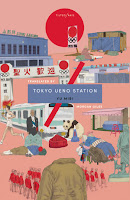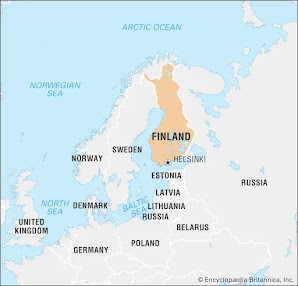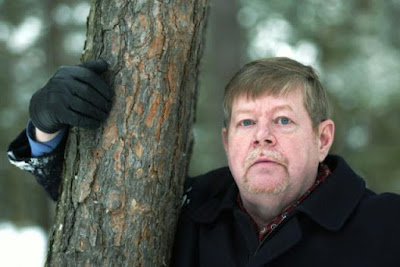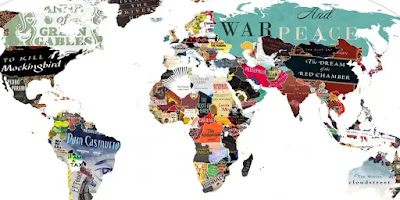Country: Japan/South Korea (Zainichi)
Book: Tokyo Ueno Station (JR上野駅公園口)
Author: Yū Miri
Publication Year: 2014 (English translation: 2019)
Genre: Fiction
Country: South Korea
Book: The Vegetarian(채식주의자)/Human Actis (소년이 온다)
Author: Han Kang
Publication Years: 2007; 2014 (English translations: 2015; 2016)
Genre: Fiction/Historical Fiction
Turning to South Korea and I find I had already read a South Korean writer in the week before I started this project. Yū Miri was born in Yokohama to Korean parents and writes in Japanese.
The Japanese word, Zainichi, meaning, ‘residing in Japan’, is applied to Koreans who have permanent status in the country. More specifically, to Koreans who emigrated to Japan during the Japanese occupation of Korea and in the years immediately after the end of World War Two.
Alison Fincher has discussed (on the ReadingJapanese Literature podcast) the relative lack of Zainichi writers who have been translated into English in comparison to Japanese writers writing in Japanese. Given the challenges of translating from Japanese to European languages in the first place, this is perhaps not a surprise. There are a few noted Zainichi writers available in English, like Megumu Sagisawa and Masaaki Tachihara (both deceased), and the subject is one of which I would like to write a longer piece further down the line.
For now, I want to briefly touch upon Yū Miri’s novel, Tokyo Ueno Station. The book deals with homelessness in Japan’s capital city, as related by the character of Kazu, who came to Tokyo in the 1960s to work as labourer in the build up to the 1964 Tokyo Olympics. Through his narrative we witness the destitution of those tent dwellers living around the eponymous Ueno Station and who are now threatened with eviction to make way for construction work for the 2020 Tokyo Olympics. We also hear the series of tragedies and misfortunes that led Kazu here.
It is a side of Japan rarely mentioned in other Japanese media. Yet is perhaps something upon which only someone still regarded as an outsider, despite being born and bred in Japan, could draw a spotlight.
I am sure it is something the western mind barely even thinks about, conditioned as we are to think of hyper industrialised South East Asian cites like Tokyo as monoliths of technology and innovation. Yet why should Japan be any different? Wherever there is success, there is also destitution.
 |
| Yu Miri |
Yū addresses all of this, but does so with a light touch. Tokyo Ueno Station is a personal story, drawing general themes from individual experience (like all the best writers). At the same time, it gives a voice to those living on the fringes of Japanese society.
For a South Korean writer actually living in and writing about South Korea, we turn to Han Kang. Han is herself the daughter of Korean novelist Han Seung-won. The two books under present consideration, The Vegetarian and Human Acts, offer differing views of South Korean life, but the methods Han employs to tell them are similar in both novels.
The central character of The Vegetarian, Yeong-hye, refuses to eat meat again after starting to experience a series of blood soaked nightmares. As with Human Acts, the story is told from the multiple viewpoints of her husband, brother in law and sister as Yeong-hye spirals further and further into psychosis.
Living in the UK, vegetarianism is no big thing. Indeed, the English title of the novel is somewhat of a misnomer, as Yeong-hye refuses to eat any animal products, including fish and dairy, and has strictly become a vegan. Yet the ideas of vegetarianism and veganism are so ingrained in our society that most British restaurants offer meat free options, even if the choice is usually somewhat limited.
In Korea, though, where meals are served in multiple small courses, the options available to vegetarians are even more restrictive. Not to mention the minefield of Korean manners, rituals and social mores. Indeed, the title of The Vegetarian is doubly misleading, as the book is not so much about the obstacles to vegetarianism, as it is about the stigma of mental illness in Korean society and the shame it is seen to bring on the family. The novel is also about exploitation of men against women and the neuro typical against the neuro divergent.
These kinds of conservative attitudes are not exclusive to Korean society of course and The Vegetarian highlights similar misogynistic and neuro typical attitudes as found in the novels, like Earthlings and Convenience Store Woman by Japanese writer, Sayaka Murata. In both books, Murata’s protagonists pretend to be in relationships with men in order to fend off the matchmaking efforts of their families.
Human Acts is perhaps less personal but no less disturbing in its focus. The books concerns the Gwangju Massacre committed by the South Korean army during the student uprising of 1980. Through a series of episodes, the killing of one student, Dong-ho, is mourned and reflected upon over more than thirty years.
As The Vegetarian is told through the eyes of multiple characters, so Human Acts moves from Dong-ho’s best friend searching for his body among the thousands brought to the morgues around Gwangju, to Dong-ho’s soul departing his mangled body, to his mother’s grief thirty years after the fact. We also witness more misogyny and the physical assault of a female journalist investigating the massacre half a decade later. Finally, Han portrays her own experience and we learn that Dong-ho was an actual victim of the Gwangju Massacre, even if the book’s portrayals are largely fictional.
Korea is a country I was already thinking about, having become interested in the Korean War. It is almost never talked about, despite having resulted in the deaths of an estimated 2,000,000 Koreans and another 900,000 Chinese soldiers, as well as the large scale destruction of the north. Yet unlike almost every other war in history, no great literature or poetry emerged from its ashes. No wonder it is known as the ‘Forgotten War’.
The only thing we think about when we think of Korea is M*A*S*H. Yet as Bruce Cumings notes in his book, The Korean War: A History, M*A*S*H is really about Vietnam, not Korea, with many of the tropes of the series being anachronistic and specific to the Vietnam War.
Just as Shakespeare focused on the War of the Roses and the assassination of Julius Caesar to discuss contemporary events from a safe distance, so the producers and writers of M*A*S*H used the obscurity of the Korean War as a smokescreen to discuss the national disaster that was Vietnam. Which makes sense. Although it is also an insult to the six to seven million victims of American aggression in Korea, Vietnam, Cambodia and Laos.
The only other place I have seen the Korean War referenced in western media is in HBO’s adaptation of Lovecraft Country (the scenes of which, credit to the show's writers, were written for the series and do not feature in Mark Ruff’s novel). The war is well overdue a retrospective.
All of which is to say that Yū Miri and Han Kang have fired my interest further in South Korean literature and culture. They are both writers to whom I will return sooner rather than later. Deeper dives into Korean and Zainichi writing are to come. Maybe in a year or two.
I undertook this project to learn more about the nations of the world through their literary artists. So far, though we are only on the fourth country, I have chosen well. Or been well directed by search engine algorithms (probably a bit of both). Long may it continue.
 |
| Han Kang |














